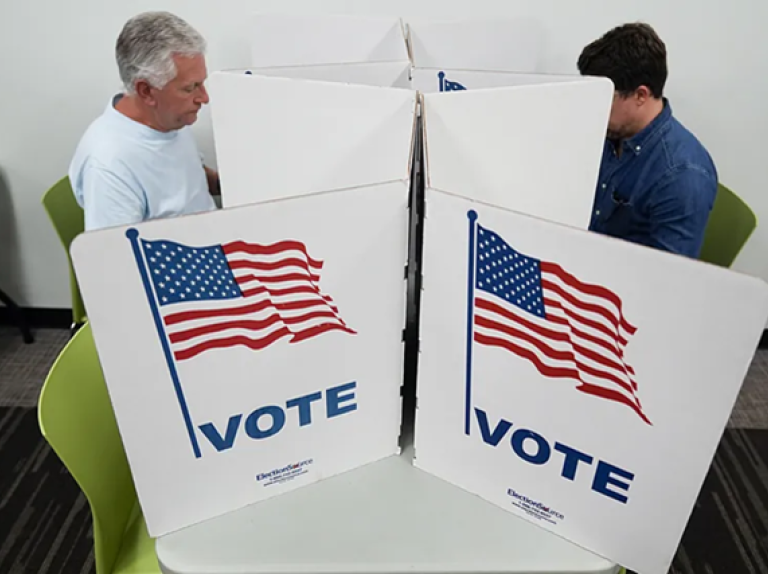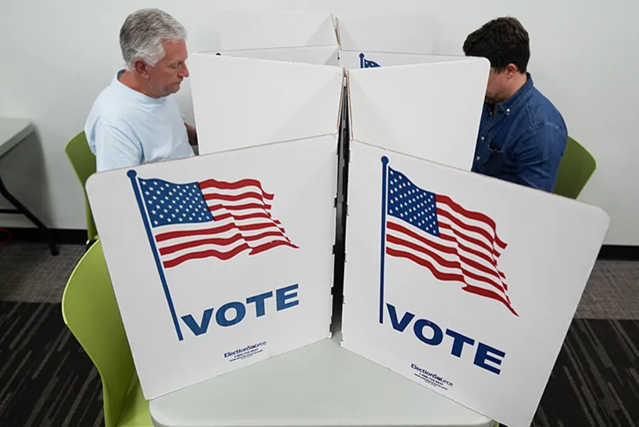
On November 5, an estimated 150 million Americans headed to the polls for this year’s general election. They decided on key ballot issues affecting our industry, from cannabis legislation to occupancy taxes and climate change. Voters from all backgrounds made their voices heard at the ballot box.
On November 5, 2024, the United States held a general election to choose a new president, Senate, and House of Representatives. Voters in this election chose to elect former president Donald Trump over current vice-president Kamala Harris. At the time of this writing, Republicans control the US Senate and the US House of Representatives, creating a trifecta with approximately 150 million Americans participating in the democratic process across all 50 states and the District of Columbia. The election brought attention to several key issues with significant implications for the travel and tourism industry.
Ballot measures addressed critical topics such as climate change initiatives, workforce development programs, the allocation of occupancy tax funding, cannabis legislation, and efforts to increase access to affordable housing. These decisions are poised to share the operational landscape for destination organizations, influence community infrastructure, and impact the overall competitiveness and sustainability of the tourism sector.

Climate Change
The 2024 election featured significant referendums and propositions on climate change, with voters across the United States demonstrating strong support for measures aimed at addressing environmental challenges, despite a polarized political landscape. In Washington State, voters rejected ballot initiative 2117 prohibiting repeal of the 2021 Climate Commitment Act and opposed state agencies implementing a cap-and-trade program aimed at reducing greenhouse gas emissions by 95% by 2050. In Louisiana, voters approved a constitutional amendment that requires any revenue received by the state for renewable energy to be deposited into the coastal protection and restoration fund. The fund allocates money for barrier island restoration, diversion projects, flood risk reduction efforts (levees, floodgates, and pump stations), marsh creation, and other work aimed at safeguarding Louisiana’s residents and businesses along the coast.
In California, voters approved Proposition 4, which allows for the borrowing of $10 billion repaid through interest from a general fund supported by tax revenue to help build resilience against a warming planet. Voters approved using general obligation bonds to mitigate climate disasters and ensure that residents, particularly in disadvantaged communities, have access to clean and safe drinking water. The passage of Proposition 4 reflects voters’ desire to not only pass the funds but also help secure clean drinking water, protect against wildfires, and gain access to clean energy.
“Californians have made it clear that they’re eager for the urgent, transformative action needed to address the climate crisis.” (Mike Young, California Environmental Voters Organization Group)
Workforce Development
Voters decided on several ballot measures related to labor including minimum wage and paid sick leave. Voters in Alaska, California, Massachusetts, Missouri, and Nebraska voted on ballot measures to increase the minimum wage and enact paid sick leave. In Alaska, voters approved Ballot Measure 1 which raises the minimum wage to $15 an hour by 2027, enacting up to 56 hours of paid leave for organizations with over fifteen employees. In Missouri, voters approved a ballot measure Proposition A, which establishes an increase to a minimum wage of $15 an hour by 2026 and one hour of paid sick leave for every 30 hours worked. Additionally, voters in Nebraska approved ballot initiative 436 requiring businesses to offer paid sick leave of up to seven days for organizations with at least 20 employees to offer five days of earned paid sick leave for those with less than 20 employees.
Moreover, voters in California and Massachusetts rejected ballot measures to increase the minimum wage including an increase to tipped wages in Massachusetts. Voters in California narrowly rejected Proposition 32, a ballot measure that proposed increasing the state’s minimum wage to $18 an hour by 2026 for all employers. The outcome of Proposition 32 was narrowly defeated by 50% to 49%, which indicates that there is strong support for raising the minimum wage to help sustain an improved quality of life, however, it was not enacted. In Massachusetts, Question 5, the initiative to increase the minimum wage for tipped employees until it reaches the state's minimum wage of $15 by January 2029, was defeated by 64 percent of voters. Under this proposed measure, tipped employees would receive the state’s minimum wage in addition to tips received.

Cannabis Legislation
For this year’s election, voters in three states decided key ballot measures about cannabis legislation for both recreational and medical use. Legislation regarding the use of cannabis was decided by voters in Florida, North Dakota, and South Dakota. In South Dakota, ballot measure 29 was decided for a third time with voters rejecting the recreational use of cannabis, following previous defeats including a court-overturned initiative. In Florida, Amendment 3, up for the first time for a vote, proposed the legalization of recreational use of cannabis for adults 21 and over. For Amendment 3 to pass, 60% of the vote was required, signaling broad support for the measure, even though it was not enacted. Regarding the medical use of Cannabis, 66% of Voters in Nebraska approved ballot measure initiative 438 supporting repealing penalties for manufacturing, delivering, and dispensing cannabis in the state.
Occupancy Tax
Local municipalities in California approved ballot measures to increase hotel occupancy tax to help fund numerous services. Voters in Auburn, CA just outside of Sacramento, CA approved ballot Measure F that increases transient occupancy tax on hotel rooms by 2%, matching nearby cities. This increase in occupancy tax allows the city to fund needed services including police, fire, parks, and general maintenance. Voters in McFarland, CA just outside of Bakersfield, CA approved measure O which approves the increase of transient occupancy tax paid by hotel guests from 6% to 12% raising an estimated $500,000 annually to help fund police and fire protection services.
Affordable Housing
Voters approved ballot measures at the local levels in various states throughout the country. Voters in Baltimore, Maryland approved Question A which authorized the city to borrow up to $20 million for affordable housing initiatives including housing counseling, relocation assistance, and housing production and preservation. In Charlotte, NC voters approved a ballot measure to approve a $100 million bond to help fund moderate- and low-income affordable housing. Additionally, the bond would help preserve rental housing, and supportive housing, and increase shelter capacity among other efforts. In Rhode Island, voters approved Question 3, establishing a 120-million-dollar bond at the state level for affordable housing and home ownership efforts representing the biggest housing bond in the state’s history.
Submit Your Thought Leadership

Share your thought leadership with the Destinations International team! Learn how to submit a case study, blog or other piece of content to DI.


